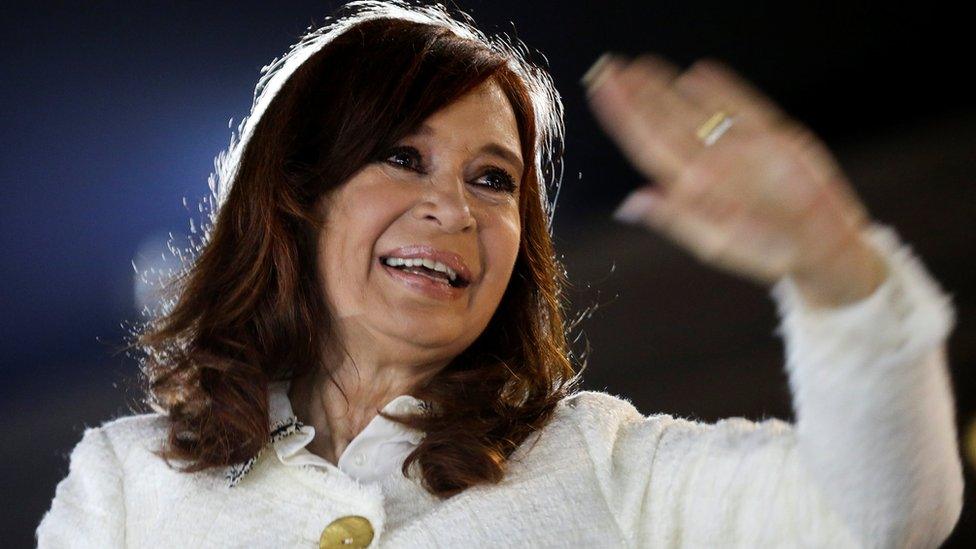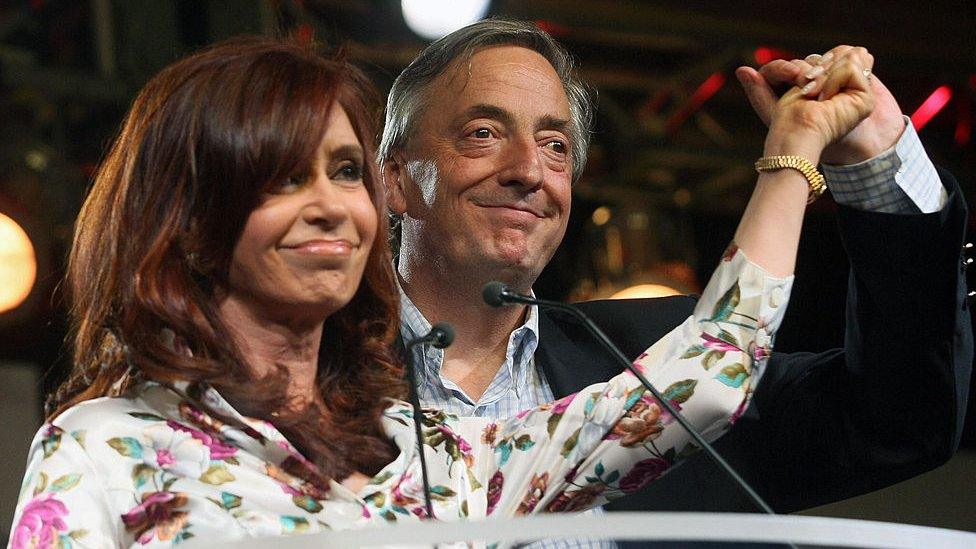Profile: Cristina Fernández de Kirchner
- Published

Cristina Fernández de Kirchner was president from 2007 until 2015
Cristina Fernández de Kirchner has held a lot of titles in her two decades at the top of Argentina's politics: the country's first elected female leader, former first lady, and now vice-president.
But for many outside the country, the shocking footage of her ducking as a loaded gun came within inches of her face in September 2022 may have been their first introduction to the left-leaning politician.
For others, it could be fact that she has become Argentina's first vice-president to be convicted of a crime while in office.
In December 2022, a court found her guilty of awarding public contracts worth $1bn (£820m) to a family friend and sentenced her to six years in jail.
Despite this latest setback, she remains a popular figure with many in the South American nation, who turned out to show their support after the verdict was made public.
She is expected to appeal against the verdict, which she described as a smear campaign aimed at removing her from office.
And while she ruled out running for a post in the 2023 election - even though the lifelong ban on holding public office she was handed by the judges will not come into force until all appeals are exhausted - few are expecting her go quietly.
'Wives' duel'
Cristina, as the majority of Argentines call her, was born on 19 February 1953 in La Plata, the capital of the province of Buenos Aires, where she went on to study law.
She married Néstor Kirchner, whom she met at university, in 1975. A year later the couple went to live in his home region, the southern province of Santa Cruz.
At the end of the 1980s she embarked on her political career - first as a member of the Santa Cruz legislative body before being elected to the national Chamber of Deputies. Meanwhile, her husband rose through the ranks of the Peronist political movement.
In 1991, Mr Kirchner was elected governor of Santa Cruz. He won two more terms, while Ms Fernández de Kirchner backed him from her position as local and later national lawmaker.
When Mr Kirchner took office as president in 2003 - in the midst of one of the worst economic and social crises in the country - a similar pattern emerged.
By then Cristina Fernández de Kirchner was a senator with her own political weight in Congress, where she actively supported her husband's policies that included boosting social spending.
Ms Fernández de Kirchner cemented her political position in the congressional elections of 2005.

Ms Fernandéz de Kirchner with her husband Néstor in 2007
She won in the province of Buenos Aires by beating her main rival Hilda González, the wife of former President Eduardo Duhalde (2002-2003).
During Mr Kirchner's administration there was almost no decision taken in which she did not have a say, her influence exceeding that of an ordinary lawmaker.
When Mr Kirchner decided not to run for a second term in office, he threw his weight behind his wife, who promptly won the presidential election.
Continuity
Occupying the presidential palace, the Casa Rosada, in her own right, Fernández de Kirchner broadly continued her husband's policies.
There were further moves to address human rights abuses of the past. Argentina also became the first country in Latin America to legalise same-sex marriages.
Under her, Argentina renewed contacts with the International Monetary Fund after years of hostility and moved to renew negotiations over paying Argentina's debts to the Paris Club of lender nations.
I have the honour to be the first woman to be re-elected in the country. What more could I want?
Cristina Fernández de Kirchner has in the past been compared to Eva Perón, Argentina's legendary first lady who formed a formidable ruling partnership with her husband Juan Domingo Perón in the late 1940s and early 50s.
But Evita was never elected. Fernández de Kirchner, by contrast, was the country's first elected female president.
She was also the first woman to be re-elected to the top job. "What more could I want," she told supporters after winning for a second time in 2011.
In October 2013 - two years after her re-election and three years after the death of her husband Néstor Kirchner - she was forced to take a month off work because of her own ill-health, after being diagnosed with bleeding in the brain.
However, she recovered from surgery and went on to serve another two years as president.
In the 2015 presidential election she was defeated by Mauricio Macri, who was then the centre-right mayor of Buenos Aires.
In 2019, centre-left Alberto Fernández was elected as Argentina's president and named Cristina Fernández de Kirchner as his vice-president.
Legal battles
But allegations of corruption relating to her tenure as president came back to haunt her during her time as vice-president.
In late August 2022, crowds began to gather outside her home in Buenos Aires in a show of support as prosecutors sought a 12-year sentence.
Then, on 1 September, a man appeared from the crowd and attempted to fire a loaded gun into Ms Fernández de Kirchner's face.
"Cristina is still alive because, for some reason yet to be confirmed, the gun ... did not fire," President Alberto Fernández said in a televised address hours later.
The motive for the alleged assassination attempt was not immediately clear. Four suspects have since been charged in connection with the incident.
Argentines rallied behind her after the attack. Thousands took to the streets to denounce political violence, with some shouting "we're all Cristina".
Firmly back in the public eye, she was being mooted as a presidential candidate for the next election, due to be held in October 2023.
But in December 2022, the long-winded corruption trial against her finally wrapped up. A court in Buenos Aires sentenced her to six years in prison and banned her from holding political office for life.
True to her combative style, she went on the counter-offensive, accusing the court of acting like a "mafia".
She is expected to appeal against the verdict and will not be barred from office or go to jail while she holds political office and until all appeals are exhausted.
But to the surprise of those who had expected her to run for the senate or even for the presidency in the 2023 election, she declared that "I won't be a candidate for anything, nor president, not senator, my name won't be on any ballot".
However, for now she remains vice-president and also a key figure in her party who is expected to play an influential role in the run-up to the 2023 election, even if it is more behind the scenes than most had anticipated.